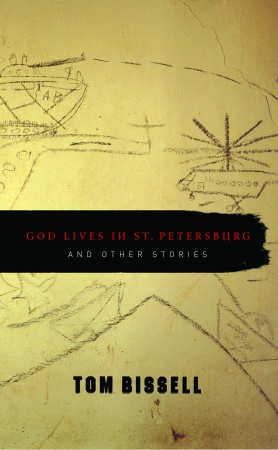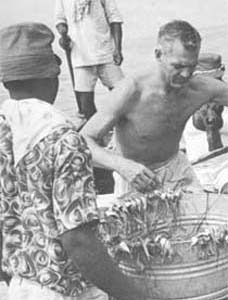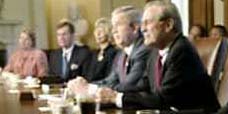
Tom Bissell, young as he is, up-to-the minute in subject matter and anointed with po-mo glamour by his connection with McSweeney and his cover quote from Dave Eggers, is nevertheless a traditional writer, a master of the well-made slice-of-life
Different Visions
AMERICAN INNOCENCE is a well-worn theme of our literature. Henry James made it his great subject. Mark Twain mined it too, though in his work the innocence was frequently transmuted into a more attractive simplicity. In The Loved One Evelyn Waugh satirized James' vision, but concurred with it. Many other imaginative writers, among whom Ernest Hemingway is perhaps the most notable, have taken up the venerable idea.
A new and very attractive contribution to this long cultural dialogue is God Lives in St. Petersburg (Pantheon, 212 pp., $20.00), a collection of stories by Tom Bissell. Now 30, Bissell was by his own admission the ultimate innocent American when he embarked for Uzbekistan in 1996. "When I joined the Peace Corps," he recently said in an interview, "I was looking for a way out of the very experientially sheltered Midwestern life I had enjoyed to that point. The terrific irony of this is that I was scared, as they say, of my own shadow." He lasted seven months and then, "suicidally miserable," fled for the security of home.
Troubled by his personal failure, he returned five years later in an attempt to somehow make it up to the country he had abandoned. The result was Chasing the Sea: Being a Narrative of a Journey Through Uzbekistan, Including Descriptions of Life Therein, Culminating with an Arrival at the Aral Sea, the World's Worst Man- made Ecological Catastrophe, in One Volume. In spite of its facetious title, this book was not a self-conscious postmodern spoof but a fine travel chronicle and a heartfelt critique of the hubristic and shortsighted greed that led to the destruction of the Aral Sea, one of the world's largest inland bodies of water.
Bissell had, indeed, made it up to Uzbekistan. He continues the process with God Lives in St. Petersburg.
The Americans in this collection of stories have all had their lives changed by their experiences in Central Asia, an ancient, violent and alien world. The Central Asians are mysterious to the American protagonists, simultaneously Asiatic and Russian, Islamic and (as a consequence of decades of Soviet rule) surprisingly secular. The whole region is an ill-defined geographical entity. As one of Bissell's characters reflects, "The Soviet Union was no more. Along with the tourist-perfect, industry-friendly teardrop-and- puddle nations that had sprouted along Russia's western flank, a jigsaw of polysyllabic, hostile-sounding nations had metastasized to the south."
The Americans are global arbiters, but they have lost their way: Unfamiliar with the wider world they are doing so much to change, they feel guilty about their privileges and supremely uncomfortable in their own skins. In "Expensive Trips Nowhere" (a story whose debt to Hemingway's "The Short Happy Life of Francis Macomber" the author is quick to acknowledge) Bissell draws a marvelous picture of one of these bewildered souls.
Douglas is "a large, soft American oaf" in the eyes of his Kazakh wilderness guide, Viktor. Douglas knows that he is "in possession of no special gift, no appreciable talent, a peasant in the New Economy's fiefdom, and that his parents, whose living disapproval had once made this condition acceptable, are dead. And he knows, too, that he is a coward." He spends his parents' modest legacy on a yearly trip "nowhere" with his wife Jayne; so far they have been to New Zealand and Jordan. Now they find themselves dwarfed on the steppes of Kazakhstan, "a sweep of land so huge and empty [Jayne] wonders if a place can be haunted by an absence of ghosts."
Bissell uses unforgettable little details to communicate the deterioration of Douglas and Jayne's once loving marriage. We watch Jayne through Douglas' eyes, squatting at river's edge, "her thighs spreading like thick flanks of beef.... Her ponytail comes apart, pungent oily hair falling into her downturned face. She blinks away the strands that catch in the barbed wire of her eyelashes." We are not privy to Jayne's thoughts, but when she looks at him with her unblinking gaze we know that she is not impressed by what she sees.
Kazakhstan tests Douglas' manhood, and it will come as no surprise that he fails the test. But while this is a familiar and even hackneyed story, Bissell tells it with such grace, and makes it so concrete and contemporary, that we are easily drawn in. We share Jayne and Viktor's contempt for Douglas, yet we share, too, their grudging pity and fellow-feeling: Which of us can deny our own pusillanimity and inadequacy? Douglas functions not only as a representative man, however, but as a representative American man, a member of the master race, and in this capacity his personal flaws become especially disturbing.
TOM BISSELL
Another representative American is Donk, the hero of "Death Defier," who is a war photographer recording the mayhem of the 2002 invasion of Afghanistan. Donk's way of handling death and his constant, generalized fear of it is to court it; hence his attraction to Human Conflict: "It was the one thing that survived every era, every philosophy, the one legacy each civilization surrendered to the next. For Donk, Human Suffering was curiously life-affirming, based as it was on avoiding death-indeed, on inflicting death pre-emptively on others. He loved Human Conflict not as an ideal but as a milieu, a state of mind one absorbed but was not absorbed by, the crucial difference between combatants and non-....
'Duncan,' a therapist had once asked him, 'have you ever heard of the term chronic habitual suicide!' Donk never saw that therapist, or any other, again."
Donk dislikes what he thinks of as "emotional nudism": whether his obsession with death is love or hate is something he chooses not to consider. Now, in Afghanistan, he is faced with the task of keeping it at bay when a colleague develops a potent strain of malaria. Traveling through the starkest and most threatening landscape imaginable ("men, men, desert, men, men, men, guns, men, guns, guns, desert, guns, men"), he must defy death both for his friend's sake and his own.
Life is just as cheap in the region's frenetic capital cities, flush with new money and delirious with new liberties. "The Ambassador's Son" is narrated by Alec, a dissipated rich boy, son of an American ambassador to a Central Asian capital, a character straight out of Brett Easton Ellis. His debaucheries are carried out not in chic Manhattan, though, but in a surrealistic city with "weird, oppressive architecture," its inhabitants ruled by a "combo of Soviet paranoia and Muslim xenophobia."
Alec would be richly dislikable were it not for his smart-ass wit and knack for cutting through pretension. With surgical precision he divides the Americans in this capital into three groups. First there are the Professional Expatriates at the embassy: "a lot of uptight stuffed shirts, stuffed blouses, stuffed heads. Most of them couldn't stray a block from embassy row without their cell phones, chauffeured cars, and International Herald Tribunes" Then there are the Do-Gooders-Peace Corps folks, NGO employees et al.: "These people, God bless them, needed a serious f___ing clue." Finally there are the Sharks, "men and women whose in-country presence consisted solely of pocketing ducats."
A break comes in Alec's self-indulgent routine when he befriends Ryan, a real sad sack-a Christian, no less-in the employ of an undercover missionary organization. Ryan is so pathetic that Alec decides to give him a riotous night out, complete with drugs, alcohol and kinky sex, at a couple of the capital's mobster dives, the Hotel Ta-Ta and the Dutch Club. The ensuing mayhem is comedy and tragedy together, with the result that Alec's seamlessly cynical worldview and his Olympian superiority to the troubles of the hoi polloi are shaken-though he will never admit this. Bissell has succeeded in creating a character simultaneously despicable and sympathetic, and he has done it with the apparent ease of a far more experienced writer.
The collection's title story is equally successful. Here a deeply confused American, a Christian missionary and practicing homosexual, is offered-practically sold-a teenaged Russian girl to marry and take back to America. As a Russian, she has no future in Uzbekistan, though her family has lived there for decades. The despair of her mother has turned into ugly cynicism: "These filthy people think they can spit on Russians now, you know. They think independence has made them a nation. They are animals, barbarians." God has deserted the Russians stranded in Central Asia-"God lives for Russians only in St.
Petersburg," comments the mother. "God does not live here. He has abandoned us." As for Christ, he "was something only an American would believe."
BISSELL, young as he is, up-to-the minute in subject matter and anointed with po-mo glamour by his connection with McSweeney s and his cover quote from Dave Eggers, is nevertheless a traditional writer, a master of the well-made slice-of-life.














